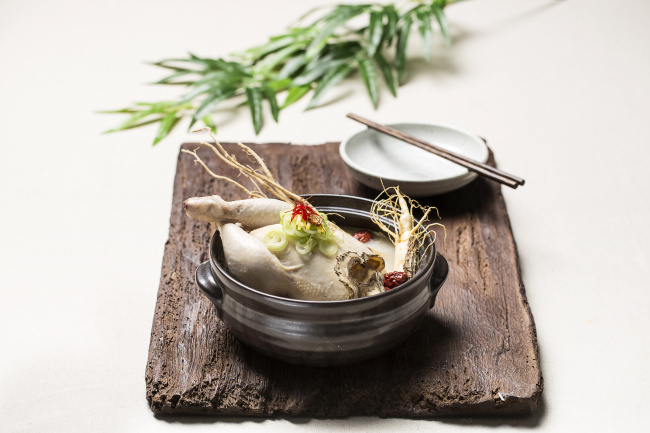[Weekender] Koreans recharge with boyangsik
Beat the heat nutritionally, emotionally with healthy food
By Im Eun-byelPublished : Aug. 9, 2018 - 15:58
It has been almost a month since a heat wave began sweeping across Korea. With temperatures breaking records, the unbearable heat has sapped people’s strength and made them lose their appetites.
Here’s where boyangsik steps in. It refers to food that strengthens and replenishes the body. Though the nutritious dishes can be consumed at any time of the year -- such as when recovering from a surgery or after giving birth -- they are often sought after in summer.
Here’s where boyangsik steps in. It refers to food that strengthens and replenishes the body. Though the nutritious dishes can be consumed at any time of the year -- such as when recovering from a surgery or after giving birth -- they are often sought after in summer.

In Korea, there is “sambok,” meaning three hot days: “chobok” (beginning), “jungbok” (middle) and “malbok” (last). The three days, based on the lunar calendar, extend over the course of a month, signaling the start and end of the sweltering summer heat.
This year’s chobok and jungbok fell on July 17 and 27, respectively. Malbok is to fall on Thursday. Koreans believe that after malbok, the heat somewhat fades away and the weather becomes tolerable.
On “boknal” -- which is often translated into English as “dog days” but just means one of the three hot days -- Koreans dig into healthy dishes at home or flock to famous boyangsik-specialty restaurants. They willingly wait in long lines in hopes of regaining their strength by eating healthy food.
“It is difficult to have samgyetang (ginseng chicken soup) on bok days. Everyone wants to have the soup,” said Kim Jin-woo, a TV producer in his mid-30s who works in western Seoul.
A few years ago, he and his colleagues had to search around the vicinity of their office for the healthy chicken soup, as they had forgotten to make an early reservation. But they failed to find a suitable place as all the samgyetang restaurants were packed with diners.
After tasting failure in his quest for ginseng chicken soup, he now makes a point of having samgyetang a day before boknal. “It just doesn’t feel right, to not have the soup. It feels as if I am not properly dealing with summer,” he said.
Though samgyetang is not the only dish of boyangsik, it is one of the most popular dishes because of its taste, price and accessibility. Dishes with boiling hot broth are often considered boyangsik -- a classic way of beating the heat with even more heat.
The ingredients for boyangsik are not strictly defined, but what is usually preferred are protein-filled meat and seafood, such as chicken, duck, octopus, abalone and croaker. Exotic ingredients including loach, snake and eel may be suitable only for strong-hearted gourmets.
Boyangsik is not just for humans. Some lucky pets enjoy the pleasure of having healthy food.
“Dogs are more susceptible to heat than humans. They are the ones that really need boyangsik,” said Bae Eun-sik, an office worker in his late 40s. He has lived near Seoul with his poodle Bomi for more than 10 years. Every summer, while grabbing boyangsik with his wife, he does not forget about his furry friend at home.
He cannot order takeaway food at a restaurant for his pet, as boyangsik for humans can be toxic for animals due to the salt the food contains.
Instead, Bae and his wife cook chicken soup or dried pollack soup at home just for Bomi. It is important to leave the salt out and to cool the soup down before serving it, Bae said.
“I can see that Bomi loses her appetite when the heat becomes too much. She usually craves for kibbles and snacks, but not when summer is at its peak. After having boyangsik, she, however, returns to her old self, energetic and active as always” Bae said.
However, having nutritious food on the three traditional hot days may not bring immediate effects for both dogs and humans.
Doctors say that boyangsik is not necessary these days, as people often consume too many calories. They say that boyangsik, if consumed too frequently, might lead to obesity.
For Koreans, however, the act of having boyangsik in summer is a cultural and emotional one, rather than the result of science and logic.
Boyangsik is often roughly translated into healthy food in English but the translation does not fully encompass its meaning.
“It is not just about the food. It is more of a seasonal ritual,” said Lim Hye-seon, an office worker in her 30s. “I am not sure if I really gain energy by having boyangsik. It is just a healthy, delicious dish. But the act of eating boyangsik reflects my desire to stay healthy.”
Lim plans to have soup made with a whole duck and medicinal herbs with her family on the last hot day of this year. “By having boyangsik on malbok, I am going to express my gratitude that my family and I have stayed healthy over the burning summer season,” she said.
By Im Eun-byel (silverstar@heraldcorp.com)








![[Graphic News] More Koreans say they plan long-distance trips this year](http://res.heraldm.com/phpwas/restmb_idxmake.php?idx=644&simg=/content/image/2024/04/17/20240417050828_0.gif&u=)
![[KH Explains] Hyundai's full hybrid edge to pay off amid slow transition to pure EVs](http://res.heraldm.com/phpwas/restmb_idxmake.php?idx=644&simg=/content/image/2024/04/18/20240418050645_0.jpg&u=20240419100350)








![[KH Explains] Hyundai's full hybrid edge to pay off amid slow transition to pure EVs](http://res.heraldm.com/phpwas/restmb_idxmake.php?idx=652&simg=/content/image/2024/04/18/20240418050645_0.jpg&u=20240419100350)

![[Today’s K-pop] Illit drops debut single remix](http://res.heraldm.com/phpwas/restmb_idxmake.php?idx=642&simg=/content/image/2024/04/19/20240419050612_0.jpg&u=)